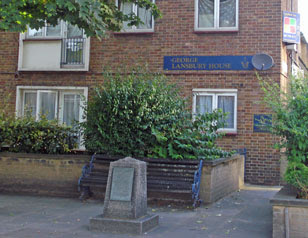 There are no prizes for being the Leader of Her Majesty's Opposition. You don't get to run anything, you're not really important, and nobody remembers you except as the answer to a pub quiz question. Which is why you lot probably aren't particularly well informed about George Lansbury, who was Leader of the Opposition for four years in the early 1930s. George was born exactly 150 years ago, which makes today a bit of a special anniversary. And he was also an East End bloke from Bow, and spent much of his life down my street, so this is an anniversary I feel is well worth celebrating.
There are no prizes for being the Leader of Her Majesty's Opposition. You don't get to run anything, you're not really important, and nobody remembers you except as the answer to a pub quiz question. Which is why you lot probably aren't particularly well informed about George Lansbury, who was Leader of the Opposition for four years in the early 1930s. George was born exactly 150 years ago, which makes today a bit of a special anniversary. And he was also an East End bloke from Bow, and spent much of his life down my street, so this is an anniversary I feel is well worth celebrating.Let me tell you ten things about 'Good old George' that you probably didn't know.
i) George was born in Halesworth, Suffolk - a market town so unexciting that George Lansbury is still its most famous resident.
ii) In his mid 20s, George and his young family emigrated briefly to Brisbane, Australia. George took various jobs to try to keep the family fed, including stone-breaking, slaughterhouse work and test match cricket ground maintenence. His antipodean experience of inequality and unemployment helped to shape his political beliefs.
iii) George's first political role was as General Secretary of the Bow & Bromley Liberal Association. From here he moved steadily leftward into radical trade unionism and Marxism, before joining the brand new Labour Party and becoming MP for Bow and Bromley in 1910. Two years later he resigned his seat to force a by-election over the issue of women's suffrage, and lost.
iv) Also in 1912, George was one of the founder members of the Daily Herald - a militant socialist daily newspaper. He steered the paper for the next ten years before handing over control to the TUC and Labour Party. The Daily Herald eventually metamorphosed into The Sun, whose post-Murdoch political slant would no doubt appal the left-wing radical who founded it.
v) In 1921, as Mayor of London's most poverty-stricken borough, George led the Poplar Rates Revolt. He was angry that richer boroughs weren't paying their share of relief to the poor, and so refused to pay £270,000 of local taxes to the London County Council. Thirty councillors were sent to prison for defying the courts, and Poplar Council business had to be conducted from inside Brixton prison.
vi) In 1927, back as Labour MP for Bow and Bromley, George joined the Cabinet as First Commissioner of Works. His many responsibilities included the Royal Parks, and it was he who created the mixed bathing 'Lansbury Lido' on the Serpentine.
vii) The 1931 General Election was the Labour Party's biggest ever landslide defeat. Only one member of the Cabinet kept his seat, and that was George, and so he became Leader of the 46-strong Opposition by default. Even in this lofty position he always travelled from Bow to Westminster by tube - part of a common touch that ensured he remained widely admired, even across party lines.
viii) George was a committed lifelong pacifist, and campaigned to disband the Army and disarm the Air Force. In any decade other than the 1930s he might have got away with it, but German militarisation left him increasingly out of step with reality. He was forced to resign as Labour leader, and took to campaigning for peace across Europe until his death in 1940.
 ix) Four years after George's death, his house at 39 Bow Road was destroyed by a German flying bomb. A block of council housing (and a plaque or two) now mark the site. George's name also lives on in Poplar's sprawling post-war Lansbury Estate, which featured as a Live Architecture exhibit during the Festival of Britain.
ix) Four years after George's death, his house at 39 Bow Road was destroyed by a German flying bomb. A block of council housing (and a plaque or two) now mark the site. George's name also lives on in Poplar's sprawling post-war Lansbury Estate, which featured as a Live Architecture exhibit during the Festival of Britain.x) George has two very famous grandchildren - actress Angela Lansbury and animator Oliver Postgate.
Four special events are being held over the forthcoming week to celebrate George's life and work. The first is this afternoon...
» Saturday 21: Radical Bow - a history walk around Bow & Bromley led by the local vicar and George's biographer – meet at Bow Road station (2pm)
» Sunday 22: Memorial Service - conducted by the local vicar, with guest preacher Rev Dr Kenneth Leech and Monsignor Bruce Kent - at St Mary's Church, Bow Road (4pm)
» Wednesday 25: Panel discussion in Committee Room 4A at the House of Lords - featuring Roy Hattersley and Shirley Williams (arrive by 6.30pm to clear security)
» Friday 27: Panel discussion at Bromley Hall, Bow Road - featuring Tony Benn and Sylvia Pankhurst's biographer (7.30pm)
No comments:
Post a Comment